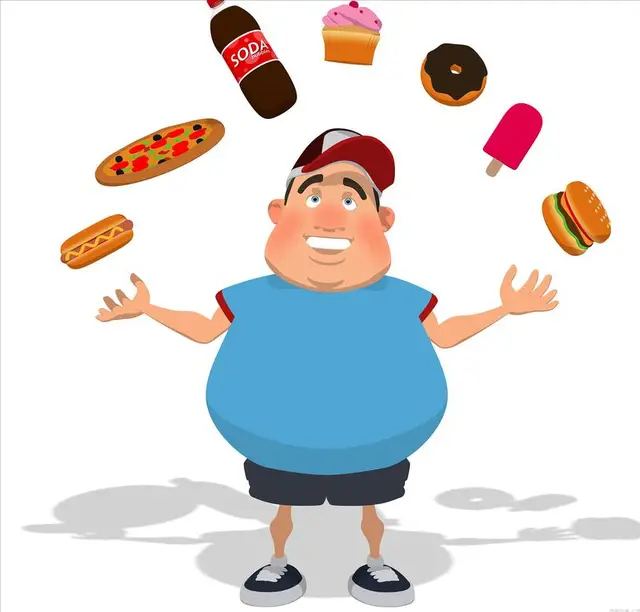Have you ever envied those friends who "never gain weight no matter how much they eat"?
Or have you ever been deeply troubled by your own physique that "even drinking cold water makes you gain weight"?
On the long and winding road of weight loss, we often focus on calorie intake and exercise expenditure, but overlook a crucial force hidden within our bodies, working non-stop 24/7: our basal metabolic rate.
It's your body's "factory setting," the minimum energy consumption required to sustain life at rest. Understanding it means mastering the key to managing weight and boosting vitality.
◆ What is basal metabolic rate?
Your body is a magnificent palace. Even when its owner is asleep and all the lights are on, it still requires basic maintenance: security patrols, boilers heat, and central systems run. The energy consumed to maintain these most basic functions is your basal metabolic rate.
More precisely, your basal metabolic rate (BMR) refers to the amount of energy your body expends to maintain all physiological activities, including heartbeat, breathing, body temperature, blood circulation, and cellular function, while you're awake, extremely quiet (lying still), and unaffected by factors like muscle activity, ambient temperature, food, and mental stress.
It accounts for 60% to 75% of your total energy expenditure, the vast majority. In comparison, physical activity accounts for only 15% to 30%, and the thermic effect of food (the energy expended in digesting and absorbing food itself) accounts for about 10%.
This means that someone with a high BMR is like possessing a high-performance, high-energy "human engine." Even lying down, they burn more calories than someone with a low BMR. This is one of the core physiological differences between those who are prone to weight loss and those who are prone to weight gain.

◆ Why does your "engine" have different efficiency?
Your BMR isn't fixed; it's shaped by a combination of innate and acquired factors.
1. Body Composition: The Most Important Determinant—Muscle
This is the most critical variable you can work on changing. Muscle is a highly active tissue. Even at rest, it consumes far more calories per kilogram than fat. It can be said that muscle is your body's 24/7 "furnace" for burning calories. A person with a lower body fat percentage and more muscle mass naturally has a higher basal metabolic rate. This explains why strength training is so crucial for long-term weight management.
2. Age: An Irreversible Metabolic Clock
Unfortunately, age is a factor we cannot counter. Starting around the age of 20-25, the body's basal metabolic rate decreases by approximately 2%-3% every decade. This is primarily due to the gradual loss of muscle mass (called "sarcopenia") and natural changes in organ function. Middle-aged weight gain isn't entirely due to willpower; a slowdown in metabolism is a natural physiological reality.
3. Gender: Innate Differences
For equal weight and height, men generally have a higher basal metabolic rate than women. This is primarily because men naturally have higher muscle mass and lower body fat percentages, and testosterone promotes increased muscle synthesis.
4. Body Size and Weight: A Bigger "Boiler" Requires More Fuel
Larger, heavier people typically have a higher basal metabolic rate. This is because maintaining a larger body (such as supporting more cells and pumping blood over longer distances) requires more energy. This is similar to how heating a large house naturally consumes more energy than a small apartment.
5. Genetics: Your Innate "Blueprint"
Genes determine the "keynote" of a person's metabolism. Some people are born with a faster metabolic rate, while others have a slower one. While genetics doesn't determine everything, they do explain why different people experience different weight changes despite the same diet and exercise regimen.
6. Hormone Levels: The Body's Command System
Thyroid hormones are the "master switch" that regulates metabolic rate. Hyperthyroidism (hyperthyroidism) can abnormally increase metabolic rate, while hypothyroidism (hypothyroidism) can significantly reduce it. Furthermore, adrenaline, sex hormones, and other factors can have complex effects on metabolism.

◆ Your "Metabolic Code": How to Scientifically Assess It?
You can roughly estimate your BMR without going to a professional.
Mifflin-St. Jeor formula (more accurate):
- Men: BMR = 10 × weight (kg) + 6.25 × height (cm) - 5 × age + 5
- Women: BMR = 10 × weight (kg) + 6.25 × height (cm) - 5 × age - 161
For example: A 35-year-old woman weighing 60 kg and 165 cm tall:
- BMR = 10 × 60 + 6.25 × 165 - 5 × 35 - 161 = 1360 kcal/day
- Note: This is an estimate and may vary. But it's a starting point for understanding your metabolism.
◆ Why might eating less lead to a slower metabolism?
This is the cruelest and most common misconception about basal metabolic rate. Many people believe that losing weight means creating a huge "calorie deficit," leading them to resort to extreme dieting strategies.
However, the body is far smarter than we think. When you drastically reduce your calorie intake, your body can't tell whether you're actively trying to fit into a size S dress or facing a "famine" crisis. To protect itself, it activates a set of age-old survival mechanisms:
- Reduce Energy Consumption: Your body automatically lowers its basal metabolic rate, much like a company cutting costs during an economic downturn. This means you burn fewer calories at rest each day.
- Preserve Fat: Your body prioritizes breaking down valuable muscle for energy (because muscle consumes more energy) while desperately trying to preserve fat reserves for the long, cold winter.
- Increase Absorption Efficiency: Your body becomes even more "stingy," striving to absorb every ounce of energy from limited food.
The end result: You may initially lose weight, but it quickly reaches a depressing plateau. Once you resume your normal diet, your metabolic rate has significantly decreased, and the excess calories are quickly converted into fat and stored, leading to a rapid rebound, or even exceeding your original weight.

◆ Stop being misled by "pseudoscience"
❌ Myth 1: Drinking coffee can "quickly boost your metabolism"
Truth: Caffeine does temporarily boost your metabolic rate by 5%-8%, but the effect only lasts for 1-2 hours. Long-term dependence may even lead to sleep problems.
❌ Myth 2: Spicy food can "burn fat"
Truth: Capsaicin may slightly boost your metabolism, but the effect is minimal (about 5%). Excessive spicy food intake can even damage your stomach.
❌ Myth 3: Walking 10,000 more steps a day can "boost your metabolism"
Truth: Walking burns calories, but it has little effect on your basal metabolic rate. The key to increasing your basal metabolic rate lies in muscle mass, not daily activity.
◆ Five Scientific Strategies for Boosting Your Basal Metabolic Rate
While we can't change our age and gender, we can effectively increase and maintain a healthy basal metabolic rate through scientific methods.
Strategy 1: Strength training: Building muscle is the key
This is the most effective way to increase your basal metabolic rate. Gaining one kilogram of muscle burns approximately 50-100 extra calories per day. This may not sound like much, but the cumulative effect is remarkable.
How to: Perform strength training 2-3 times per week, targeting major muscle groups (such as chest, back, legs, and core). You don't have to aim for a bodybuilder; using resistance bands, dumbbells, gym equipment, or even bodyweight exercises (such as squats and push-ups) can be equally effective.
Strategy 2: Eat a high-protein diet and leverage the "thermic effect of food."
The body consumes more energy to digest protein than carbohydrates and fat (the thermic effect of food is the highest, up to 20%-30%). Furthermore, adequate protein is the raw material for building and repairing muscle.
How to: Ensure every meal contains high-quality protein, such as chicken breast, fish, shrimp, eggs, soy products, and milk.
Strategy 3: Drink plenty of water to keep your metabolism running smoothly.
Water is the medium that fuels all chemical reactions. Even slight dehydration can slow your metabolism. Studies have shown that drinking 500 ml of water can quickly boost your metabolism by 10%-30%.
How to: Drink 1.5-2 liters of water daily, in small, frequent drinks. Drinking a glass of water with breakfast and before exercise is a great way to quickly activate your metabolism.
Strategy 4: Get enough sleep to avoid hormone imbalances.
Long-term sleep deprivation is a hidden killer of metabolism. It disrupts the balance between leptin (which suppresses appetite) and ghrelin (which stimulates appetite), increasing your craving for high-calorie foods. It also increases cortisol levels, which promotes muscle breakdown and fat storage.
How to: Strive to get 7-9 hours of quality sleep each night.
Strategy 5: Eat smart and exercise to keep your metabolism active.
- Eat smaller, more frequent meals: Splitting your daily meals into four or five can prevent the metabolic slowdown caused by prolonged hunger and maintain the thermic effect of food.
- Add high-intensity interval training: HIIT not only effectively burns fat during exercise but also produces an "afterburn effect" (EPOC), keeping your metabolic rate elevated for hours after exercise.
- Drink some green tea/coffee: Caffeine and catechins can slightly increase your metabolic rate in the short term, but the effect is limited and shouldn't be used as a primary remedy.
"Don't compare your weight to others; compare how your body interacts with you."
Your basal metabolic rate is your body's language. Understanding it will put you in control of your health.

%20--%3e%3c!DOCTYPE%20svg%20PUBLIC%20'-//W3C//DTD%20SVG%201.1//EN'%20'http://www.w3.org/Graphics/SVG/1.1/DTD/svg11.dtd'%3e%3csvg%20version='1.1'%20id='图层_1'%20xmlns='http://www.w3.org/2000/svg'%20xmlns:xlink='http://www.w3.org/1999/xlink'%20x='0px'%20y='0px'%20width='256px'%20height='256px'%20viewBox='0%200%20256%20256'%20enable-background='new%200%200%20256%20256'%20xml:space='preserve'%3e%3cpath%20fill='%23FFFFFF'%20d='M194.597,24.009h35.292l-77.094,88.082l90.697,119.881h-71.021l-55.607-72.668L53.229,232.01H17.92%20l82.469-94.227L13.349,24.009h72.813l50.286,66.45l58.148-66.469V24.009z%20M182.217,210.889h19.566L75.538,44.014H54.583%20L182.217,210.889z'/%3e%3c/svg%3e)




